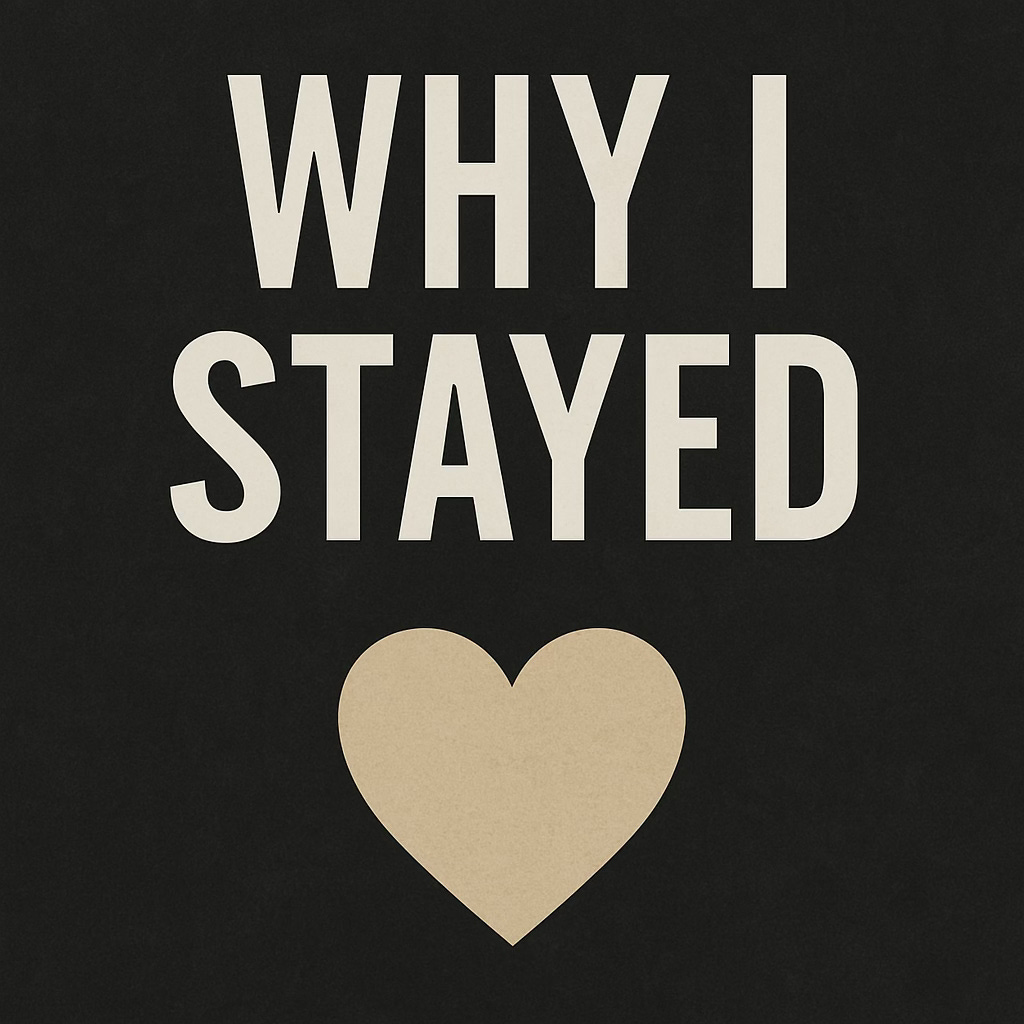Chapter 3 - Why I Stayed, and What I Feared Most
From THX Series Hub: The Narcissist’s Playbook & The Life After
Healing After Narcissism,
(Framed by Prospect Theory from the THX Framework)
Author’s Note: This post contains reflections on abuse, fear, isolation, and emotional survival. Please take care as you read.
The question comes quietly but often:
“Why did you stay?”
Sometimes it’s asked with genuine curiosity.
Sometimes with judgment.
Most of the time, I ask it of myself.
The short answer is this:
Because staying felt safer than leaving.
The longer answer?
Because I knew what to expect when I stayed.
I didn’t know what would happen if I left.
This is what Prospect Theory helped me understand years later:
People fear loss more than they value gain.
It’s human. It’s wired into us.
And when you’re in a narcissistic relationship, your entire sense of self and safety is calibrated to fear.
I feared losing my daughters.
Even when she threatened to leave without them, there was always a shadow of doubt:
What if she changes her mind? What if she twists the story? What if the court believes her version?
So I stayed, because being close meant being protective.
Being nearby meant maybe I could shield them.
Even if it meant sacrificing myself.
I feared losing my stability.
She threatened the money. The car. The house. My reputation.
In many ways, she weaponized uncertainty—and uncertainty is poison when you’re already exhausted.
I stayed because I feared ending up without a job, without transportation, without the ability to care for the girls.
I stayed because I needed time to plan my escape—quietly, carefully, invisibly.
I feared no one would believe me.
She was so good at niceness in public.
She played the part. Said the right things. Volunteered. Smiled.
Who would believe that behind closed doors she could be cruel, controlling, manipulative, even dangerous?
Who would believe I—calm, competent, capable—was living in fear?
I feared regret.
What if I left and ruined everything?
What if the girls resented me?
What if I made things worse?
Narcissistic abuse doesn’t just damage your heart. It rewires your reasoning.
You start to see yourself through their lens: too emotional, too needy, too dramatic, too broken to trust your own instincts.
So I stayed.
Not because it was good.
But because it was predictable.
And predictability is its own kind of safety when you're living in chaos.
But here’s what else Prospect Theory teaches us:
At some point, the fear of staying becomes bigger than the fear of leaving.
And that moment—when it comes—is like breaking through the surface of deep water.
You gasp. You cry. You breathe.
And for the first time in years, you see that the pain of staying has outweighed the imagined loss of leaving.
That’s when things began to shift for me.
Final Scene — The Moment of Clarity
It got to a point where even my words weren’t mine anymore.
She began listening to my client calls—not just eavesdropping, but taking notes I later found.
She hid on the stairs while I spoke with close friends, then used the information to shame or discredit me.
Eventually, I started driving to a dark parking lot two miles away just to have a private conversation.
And then came the night that changed everything.
I had just experienced another severe anaphylactic reaction—brought on by her carelessness, and followed by her usual denial.
Later, I was on a video call with trusted friends, calmly recounting the story as if it were just another day in the life.
Then one of them paused, leaned closer to her camera, looked me in the eye, and asked:
“Are you safe?”
And something in me cracked open.
That was the moment I realized the truth:
I am not safe.
Not emotionally. Not physically. Not psychologically.
And if I died—if she triggered another reaction and I didn’t make it—my daughters would be left with her.
The fear of leaving had always loomed large. But now, the fear of staying loomed larger.
That was the pivot. The moment the scales tipped.
Because in that moment, I saw every loss I had feared—
The loss of the life I hoped for.
The ideal of a marriage that never really was.
The inevitable estrangement from friends or family who’d been gaslit into believing her version of me.
The house. The businesses. The life I’d built.
And none of it mattered compared to what I could lose if I stayed.
My life. My daughters’ safety. Their sense of what love should look like.
That’s when the mask fell. And in its place, truth rushed in.
Leaving didn’t feel brave at first. It felt terrifying.
But it also felt true.
And that truth was enough to carry me through the next chapter.
In the next post, I’ll share how I planned my exit—strategically, quietly, and with the help of the very frameworks I now teach. Because narcissists are predictable. And truth, when paired with clarity and timing, becomes a form of protection.
Post 3: The Exit Plan will walk through how I made a way out—not just for me, but for my girls too.
Reflection Prompt
Has there ever been a moment—small or seismic—when someone asked you a question that shattered your silence?
Who helped you see the truth more clearly?
Sometimes, it only takes one voice to call you back to your own.

Interpretation: The minimalist heart beneath the stark phrase reflects the emotional complexity of staying in an abusive relationship—not out of blindness, but out of calculation, compassion, and fear. The contrast of soft symbol and sharp type echoes the tension between intention and reality.
